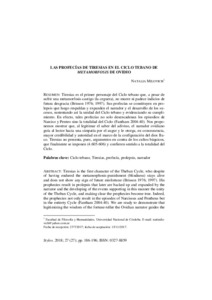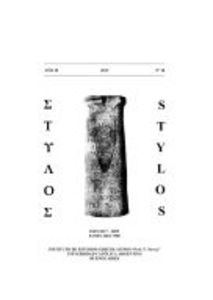Por favor, use este identificador para citar o enlazar este ítem:
https://repositorio.uca.edu.ar/handle/123456789/9756| Título: | Las profecías de Tiresias en el Ciclo tebano de Metamorfosis de Ovidio | Autor: | Milovich, Natalia | Palabras clave: | PROFECIA; ANALISIS LITERARIO; ANALISIS DEL DISCURSO; TIEMPO NARRATIVO; LITERATURA GRIEGA; Ovidio, 43 a.C.-17 d.C. | Fecha de publicación: | 2018 | Editorial: | Universidad Católica Argentina. Facultad de Filosofía y Letras. Instituto de estudios grecolatinos "Prof. F. Nóvoa" | Cita: | Milovich, N. Las profecías de Tiresias en el Ciclo tebano de Metamorfosis de Ovidio. [en línea]. Stylos, 2018, 27. Dispinible en: https://repositorio.uca.edu.ar/handle/123456789/9756 | Resumen: | Resumen: Tiresias es el primer personaje del Ciclo tebano que, a pesar de sufrir una metamorfosis-castigo (la ceguera), no muere ni padece indicios de futura desgracia (Brisson 1976; 1997). Sus profecías se constituyen en pro-lepsis que luego respaldan y expanden el narrador y el desarrollo de los su-cesos, sustentando así la unidad del Ciclo tebano y evidenciando su cumpli-miento. En efecto, tales profecías no solo desencadenan los episodios de Narciso y Penteo sino la totalidad del Ciclo (Fantham 2004:40). Nos propo-nemos mostrar que, al legitimar el saber del adivino, el narrador ovidiano guía al lector hacia una simpatía por el augur y le otorga, en consecuencia, mayor credibilidad y autoridad en el marco de la configuración del dios Ba-co. Tiresias no presenta, pues, argumentos en contra de los cultos báquicos, que finalmente se imponen (4.605-606) y confieren sentido a la totalidad del Ciclo. Abstract: Tiresias is the first character of the Theban Cycle, who despite of having endured the metamorphosis-punishment (blindness) stays alive and does not show any sign of future misfortune (Brisson 1976; 1997). His prophecies result in prolepsis that later are backed up and expanded by the narrator and the developing of the events supporting in this manner the unity of the Theban Cycle, and making clear the prophecies become true. Indeed, the prophecies not only result in the episodes of Narcissus and Pentheus but in the entirety Cycle (Fantham 2004:40). We are ready to demonstrate that legitimizing the wisdom of the fortune-teller the Ovidian narrator guides the reader to feel affection for the augur, and consequently gives him more cred-ibility and authority in the frame of configuration of the god Bacchus. Then, Tiresias does not present arguments against Bacchus worships, which are fi-nally imposed (4.605-606) and confer sense to the entirety of the Cycle. |
Cobertura Temporal: | SIGLO VIII a C SIGLO VII a C |
URI: | https://repositorio.uca.edu.ar/handle/123456789/9756 | ISSN: | 0327-8859 | Disciplina: | LITERATURA | Derechos: | Acceso abierto | Fuente: | Stylos Nº 27, 2018 |
| Aparece en las colecciones: | STY - 2018 nro. 27 |
Ficheros en este ítem:
| Fichero | Descripción | Tamaño | Formato | |
|---|---|---|---|---|
| profecias-tirecias-ciclo-tebano.pdf | 197,09 kB | Adobe PDF |  Visualizar/Abrir | |
| stylos27.jpg | 297,44 kB | JPEG |  Visualizar/Abrir |
Visualizaciones de página(s)
218
comprobado en 30-abr-2024
Descarga(s)
1.222
comprobado en 30-abr-2024
Google ScholarTM
Ver en Google Scholar
Este ítem está sujeto a una Licencia Creative Commons

